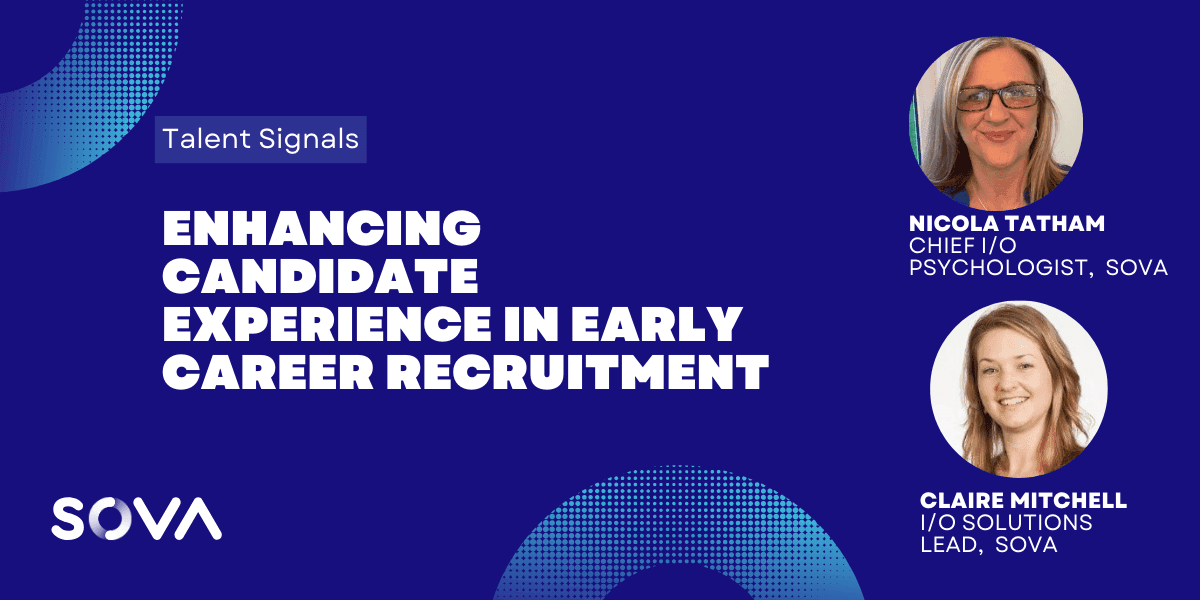Evaluate graduates and apprentices based on their skills and potential | NEW Early Careers Assessment
Enhancing Candidate Experience in Early Career Recruitment

In today's talent acquisition landscape, early career recruitment has emerged as a focal point. This demographic, often entering the workforce for the first time, presents a unique set of challenges and opportunities for organisations worldwide. This extends beyond merely attracting early career individuals; it involves nurturing their development to align with the strategic objectives. This cohort has been impacted by the global pandemic and have significantly less work experience than we have traditionally seen in this age group. By placing greater emphasis on a candidate’s potential and aptitude rather than conventional recruitment criteria (i.e. exam grades and relevant work experience), organisations can open their doors to a more diverse and better-equipped workforce.
Creating seamless engaging candidate journeys
To attract top talent, companies must seek to create a seamless and engaging journey for early career candidates, by prioritising candidate experience and leaving a lasting positive impression. This involves not only simplifying the application process, but also ensuring consistent communication and feedback. Further, candidates will appreciate personalised interactions and being provided with clear information about the company culture and values.
Leveraging Blended Assessment in Recruitment
Blended assessments can enhance early career recruitment, particularly when candidates may not have an extensive work history. This approach combines a variety of assessments (such as skills testing, situational judgement, potential aptitude, and attitude towards your organisation) to understand the ‘whole’ candidate and make the right decision. This approach is vital because it focuses on assessing a candidate's potential rather than solely judging them on their past experiences. Traditional hiring methods often rely heavily on work experience, which can unfairly disadvantage recent graduates or those entering the workforce for the first time. A blended assessment approach can also aid the measurement of softer business-ready skills like ‘influencing’ and ‘negotiating’ which exam results cannot help with. “Using the blended assessment approach with Sova, we really see different aspects of their (candidates’) potential – their skills, potential aptitude and attitude towards the organisation.” Cath, ATOS
The Role of Video Interviewing
One-way video interviewing has become an integral part of modern recruitment processes and was particularly effective during the global pandemic. This approach not only saves time and resources for recruiting teams but also supports a more inclusive recruitment strategy. Offering candidates, the flexibility to complete a video interview at a convenient time for them, with no travel required, can increase the talent pool, and help recruiters to make informed decisions, identifying the best talent.
Virtual Assessment Centre (VAC)
The Virtual Assessment Centre (VAC) simulates work tasks, offering an immersive and interactive experience. Through VAC, recruiters can evaluate candidates in various scenarios that mimic real job challenges. This method provides deeper insights into the candidates' problem-solving abilities, teamwork skills, and overall suitability for the role. Using this technology, candidates can even meet current employees to learn more about the day-to-day details of the role and gain a different perspective of the organisation which, again, can help with a personalised and engaging process for candidates. This style of virtual assessment can drive a fairer assessment process, helping organisations to reach a wider candidate pool.
Data-Driven Recruitment
By leveraging real-time data, organisations can check for fairness and diversity in their hiring processes. Data analytics helps in identifying the most effective recruitment channels, reviewing the success of the campaign, and making informed process improvements.
Nurturing Talent for Future Success
The journey of early career candidates does not end at recruitment; it is just the beginning. Organisations must focus on nurturing this talent for future success. This involves providing comprehensive onboarding, continuous learning and development opportunities, and clear career progression paths. Also, keeping in mind that each candidate is different and should be treated uniquely. Supporting the professional growth of early career hires not only aids in their personal development but also ensures that the organisation builds a strong, skilled workforce for the future.
Collectively, these approaches not only improve the quality of hires but also reinforce a company's commitment to diversity and innovation. As organisations continue to navigate the complexities of talent acquisition, prioritising a seamless and engaging candidate journey is more than just a trend; it is an essential strategy for building a robust and future-ready workforce.